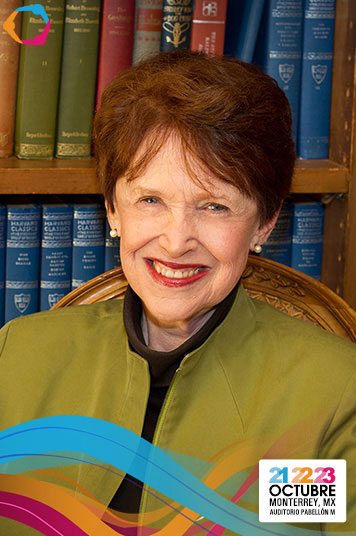 Caring Economy: What?s Good for Women is Good for the World
Caring Economy: What?s Good for Women is Good for the World
?The Real Wealth of Nations gives us a template for the better world that we have been so urgently seeking. As practical as it is hopeful, this brilliant book shows how we can build economic systems that meet both our material and spiritual needs.? – Archbishop Desmond Tutu, Nobel Peace Laureate
Acclaimed systems scientist Riane Eisler, author of the The Real Wealth of Nations, The Chalice and The Blade, Sacred Pleasure, Tomorrow?s Children and one of the most innovative thinkers of our time, presented an opening keynote, ?Econom?a del Cuidado (Caring Economy): What?s Good for Women is Good for the World?, at the Eighth Worldwide Meeting on Human Values in Monterrey, Mexico, October 21, 2016.
Over 4,000 people attended the conference, which was live streamed to 200,000 more at universities and other venues. The conference was hosted by Encuentro Mundial de Valores and has been keynoted in the past by such dignitaries as the H.H. Dalai Lama and Mary Robinson.?
Eisler, like Einstein, notes that we cannot solve problems with the same thinking that created them. To solve our global challenges, humanity must move beyond both capitalism and socialism. Each came out of early industrial times, and we are well into the postindustrial age of automation, robotics, and artificial intelligence. We must rethink our metrics for ?productive work.? We need the economic rules, measurements, policies, and practices of a caring economics or partnerism, which reward the most essential human work: caring for people, starting in early childhood, and caring for nature.
Eisler places economic transformation in its social context, showing that to construct a more equitable and sustainable future we must go beyond old categories like right vs. left, religious vs. secular, and Eastern vs. Western. Societies in all these categories have been repressive, violent, and environmentally destructive. None pay attention to how a society constructs the relations that neuroscience shows directly impact how our brains develop: the childhood and gender relations where children first learn what is, or is not, valuable, normal, or moral. Studies also show that the status of women is a powerful predictor of a nation?s quality of life and economic success.
The new social categories of domination systems and partnership systems show the interaction between politics and economics, on the one hand, and family and other intimate relations, on the other ? and the benefits of partnership systems for both men and women.
Partnership and Caring Economy leaders are active applying the Partnership framework in business, healthcare, policy, education and media. The Center for Partnership Studies and The Caring Economy Campaign, founded by Riane Eisler, offers inspiring leadership programs, resources and tools for cultural change leaders and caring economy advocates worldwide.?
Eisler?s speech was be followed by a dialogue between her and investigative journalist, Suez Taylor and Bolivian author and activist Elizabeth Peredo (publisher of the Spanish edition of Eisler?s The Real Wealth of Nations – La Verdadera Riqueza de Naciones). Other speakers included Carl Anthony, Dr. Doris Sommer, Irene Villa, Tim Harris, and Esthela Gutierrez of Mexico. The focus of this year?s event was Solving Social Crisis with the Value of Justice supported by three anchoring themes: Social Justice, Fair Economy, and Restorative Justice. The conference was broadcasted to over 200,000 students & educators in over 89 countries worldwide.


Leave a Reply